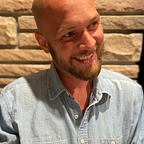Letter to the Editor. Bakhmut.
Guest Post: by Shiah Lints (freelance photographer and friend in Ukraine); all photos by Shiah
On the train from Kyiv the snow slowly fades away, replaced by the silent gaze of fallow fields. Then in the final miles before Kramatorsk, I recognize the illusion. Freezing rain has covered the earth with a layer of ice. We stop. Disembarking passengers waddle with heavy bags trying to remain upright. There is uneasy humor in the situation. I am here to meet friends who will take me to Bakhmut, a small town on the edge of the Ukrainian front line that the Russians have been trying to claim for months. All reporting suggest that for some reason they desperately want this prize and they are throwing everything at it.
I pay a taxi to show me the sites in Kramatorsk. There has been shelling here but not too much. Most people have left and most remaining people are soldiers or the elderly. I meet my friend, Igor, at a vacant flat he has rented. The owners clearly left in a hurry. Their personal effects still occupy the shelves and there is scotch tape over the cabinets we should not open.
The next day I leave Igor, whose work takes him elsewhere. I meet Ed and Eugene on the curb and head toward Bakhmut.
Eugene was a freelance photographer in Kharkiv before the war and is now a freelance photojournalist. Ed is a freelance photojournalist from Israel driven to document this tragedy of human making. The back of Ed’s van has been converted into a mobile darkroom he uses to prepare and develop glass slides, a photographic process not commonly seen since the US Civil War.
After clearing the last checkpoint we are on the road to Bakhmut. The rising sun comes out for the first time in weeks and we all comment on the brilliance of the light, which filters through the frozen trees that line the road.
There is no checkpoint on the edge of the town — just broken cars and broken buildings. We drive through the town and cross the river on a military bridge. We hide the van behind a building on the east end of town in a row of parallel apartment blocks. Getting out of the van I am struck by the sound. Shells explode continually, some just blocks away. We talk to the soldiers huddled in the doorways. Crossing open space is done quickly. I can hear the pop of machine gun fire from the rooftops and wonder what the Ukrainians are seeing that they feel they can shoot.
After some time Ed convinces some soldiers to let him take their portraits. We hurry back to the van. Ed covers a glass slide with silver and I help him carry the camera and the wet plate back to the soldiers. They pile out of their basement shelter and and stand still for the ten seconds it takes to expose the glass. Then we go back to the van to develop the plate.
Time spent in the van is dangerous, as there is no cover. I stand outside the van and keep watch. With the slide developed we hurry into the basement to talk to the soldiers and get their stories. It’s damp, smelly, covered with garbage. They cannot take the garbage out as it would only give away their position.
On our way out of town we meet a group of three female volunteers delivering aid to the old people that refuse to leave. We accompany them to the field hospital and help load their van with supplies. For security reasons we are not allowed to photograph the hospital. There are bloody stretchers piled by the door and body bags in front of a neighboring building. I cray uncontrollably as the dead are loaded into the a van like you would throw firewood into the back of a truck. In Bakhmut death is so common that energy can’t be spent to mourn. That must wait until after the war.
